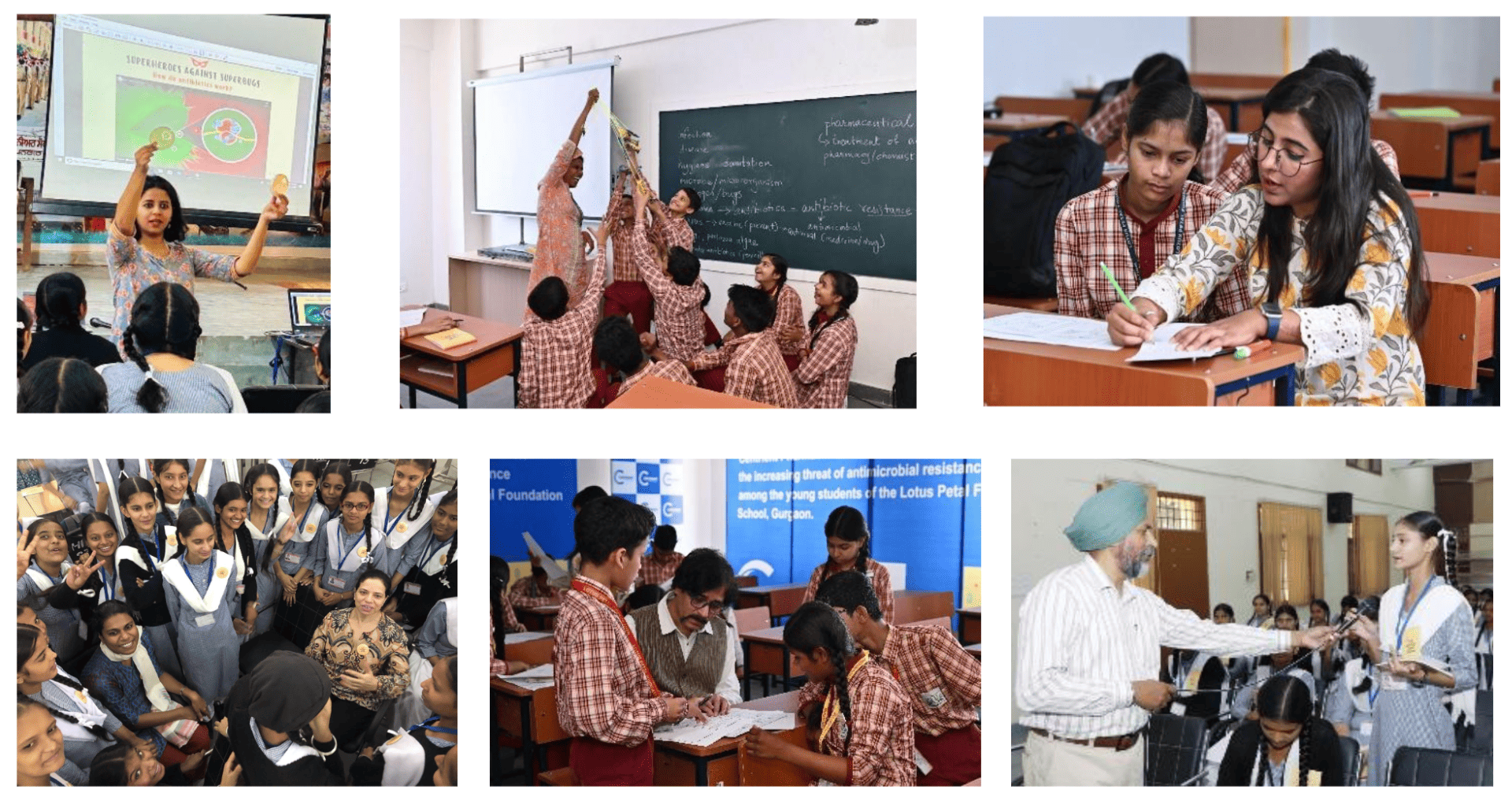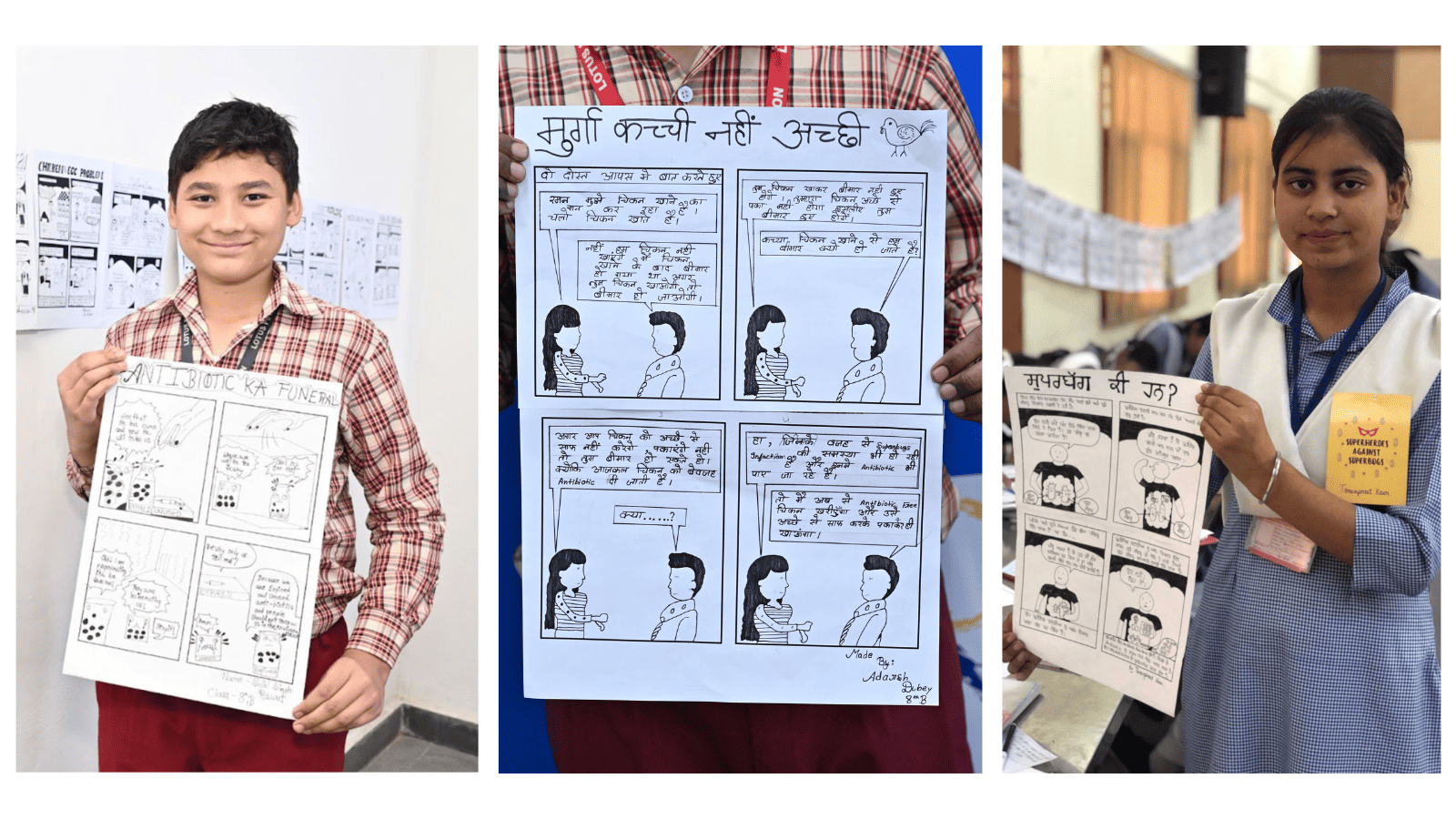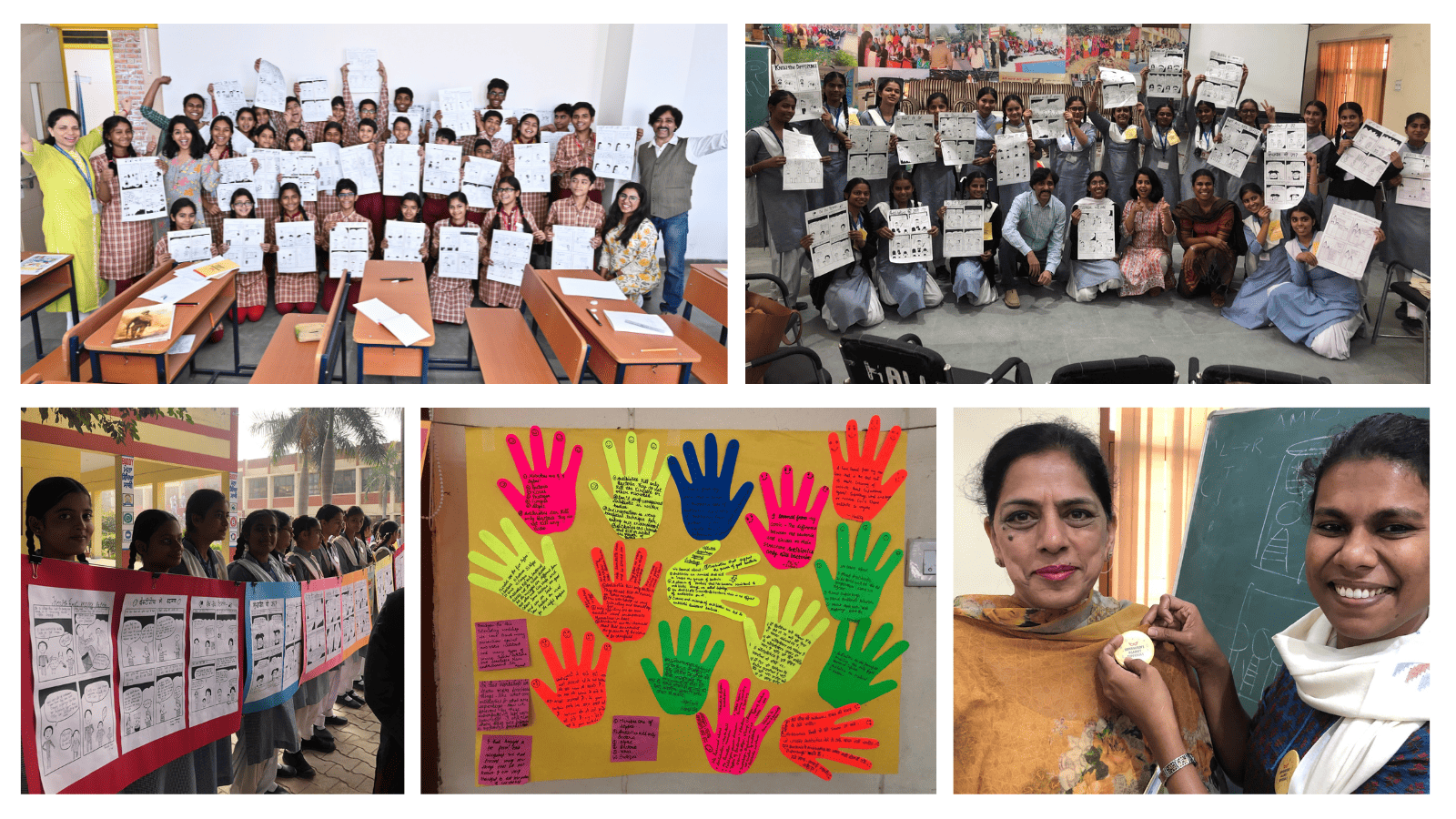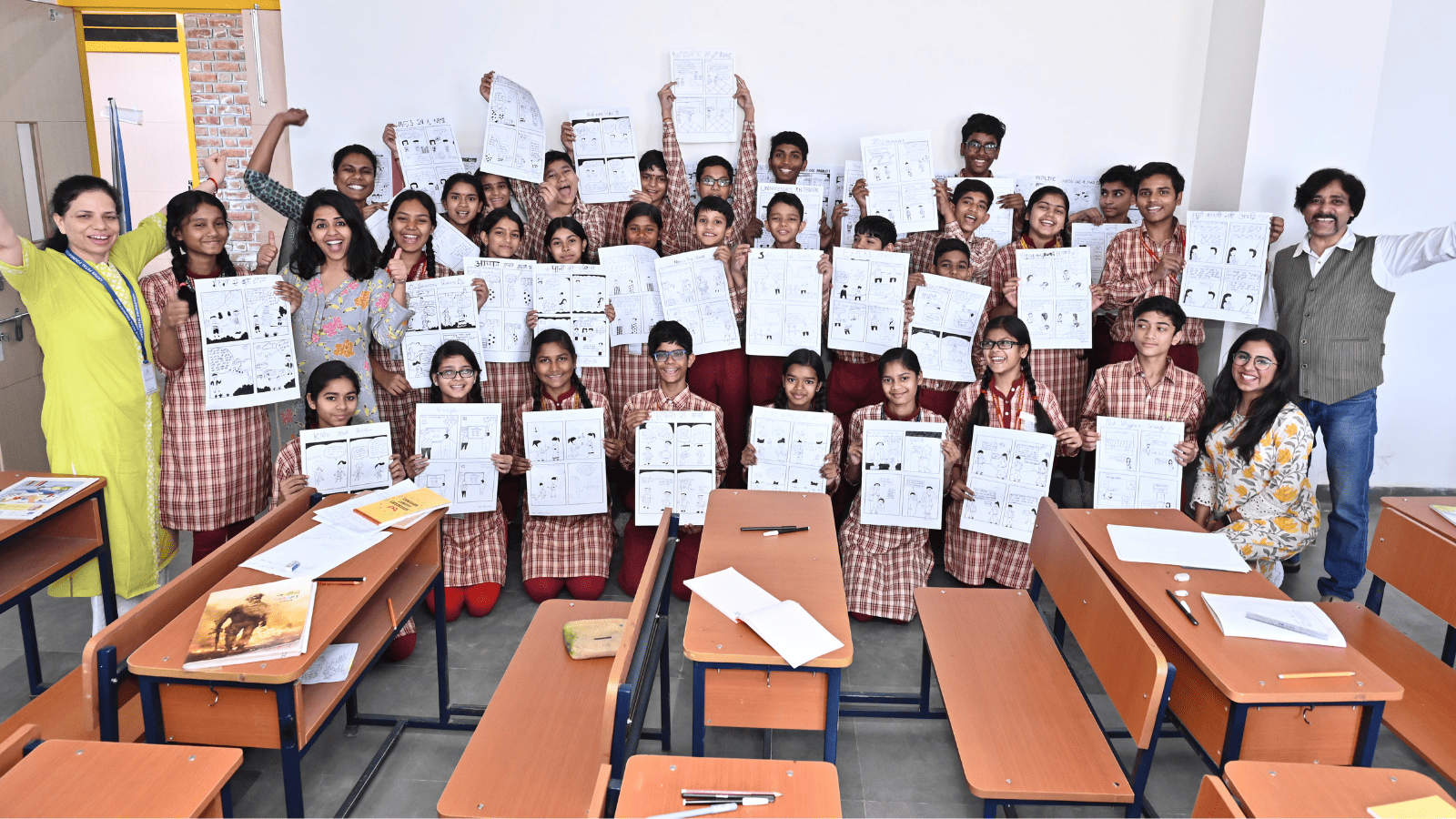To combat the growing threat of Antimicrobial Resistance (AMR) and promote responsible antibiotic use and WASH practices, two 3-day workshops were conducted for around 80 students aged between 12-16 years at Govt. Senior Secondary School (GSSS), Girls, Ropar, Rupnagar, Punjab, from 3-5 November 2022 and at Lotus Petal Senior Secondary School, Dhunela, Gurgaon, from 28-29 March 2023. These workshops were conducted by Superheroes Against Superbugs (SaS) and World Comics India (WCI) with funding and operational support from Centrient Pharmaceuticals.
The workshops took a multi-pronged approach to raising awareness and taking action on AMR. Through informational and interactive lectures and activity-based sessions, participants gained a better understanding of the science behind AMR and factors that contribute to the development and spread of AMR or drug-resistant infections, such as irresponsible use of antibiotics, poor hygiene, inadequate infection control, etc. Through the medium of Grassroots Comics, participants creatively reflected on how AMR impacts their lives and what could be some possible solutions. The final exhibition of the grassroots comics in their schools helped the young AMR champions share their messages and stories on AMR with their peers and teachers.
About the Workshops

Prior to the on-site workshop, the facilitators from SaS and WCI interacted online with the students at the GSSS, Girls, Ropar, priming them about the workshop theme and the medium of Grassroots comics. Due to the academic schedule, it was not possible to organise a similar online session with students at Lotus Petal Sr School.
In line with the regular SaS workshops, SaS facilitators, Dr. Somdatta Karak, Dr. Sarah Hyder Iqbal, and Ms. Manvi Sharma (at Lotus Petal Sr. School) led informative sessions using multimedia presentations and hands-on activities to help students understand the complex nature of AMR, superbug formation, the spread of AMR, and ways to prevent this silent pandemic. At the Ropar school, students also developed 5-minute plays on the following themes: bacterial and human cells; different types of microorganisms; different modes of infection spread; and what do you do when you fall sick? which served as a refresher of these concepts and an effective conversation starter. Furthermore, SaS facilitators also addressed the school and the teachers at their morning assembly and shared information about the workshop and AMR.
With Centrient Pharmaceuticals as our partner for this series, the students had the opportunity to interact with experts from Centrient to delve into the critical issue of pharmaceutical waste disposal. The discussion with the Centrient staff, Mr. Manjeet Singh, Ms. Suman Sharma, and Mr. Ajaya Sharma, encompassed various aspects, including proper methods for disposing of antibiotics, the consequences of antibiotic disposal in the environment, and current protocols for ensuring the safe and responsible disposal of antibiotics, particularly by pharmaceutical companies.
Following these informational sessions, Mr. Sharad Sharma (WCI) guided the students in transforming their understanding of AMR issues into visually captivating grassroots comics. During the comic making process, the facilitators had the chance to further clarify questions and doubts around AMR and superbugs to ensure the students understood the concepts clearly and were able to communicate them through the comics.
The use of local languages plays a crucial role in effectively communicating about AMR, as it ensures that the message reaches a wider audience and resonates with local sensibilities. These workshops provided an excellent opportunity to emphasize the importance of regional languages, enabling participants to create informative and visually captivating grassroots comics in three different languages: Punjabi, English, and Hindi. By utilizing local languages, the workshops enabled students to express themselves and their ideas more freely.

The students’ grassroots comics, meticulously crafted, found a vibrant showcase within their own schools and digitally through social media, effectively propagating awareness on AMR and promoting responsible antibiotic use and disposal practices in different languages.
Along with students, teachers were also actively involved in the conversations during the workshops. Their participation not only facilitated deeper understanding and engagement but also ensured that the AMR awareness message would be carried forward within the educational institutions.

With utmost creativity and passion, the students skillfully crafted captivating stories in the grassroots comics that shed light on the pressing concerns surrounding antibiotic disposal in pharmaceutical waste, the misuse of antibiotics in agricultural and animal farming practices, and their impact on human health. These thought-provoking narratives effectively captured the multifaceted dimensions of the issue.
Overall, these AMR awareness workshops across different geographies demonstrate the power of education and creativity in fostering an informed and proactive generation. By equipping students with the knowledge and skills necessary to tackle complex public health issues such as AMR, we are investing in a brighter and healthier future for all, transcending geographical, economic, and cultural barriers.
Conclusions and recommendations
We believe that young people are an important stakeholder in the fight against AMR, and therefore, their role in addressing this public health crisis cannot be undermined. Since AMR is not an explicit part of the current school education syllabus, AMR awareness workshops for school students such as these can help inform and empower them to take action to prevent AMR in their communities and beyond. Regular awareness programmes can help ensure that antibiotics remain effective for future generations and mitigate the impact of AMR on public health and healthcare systems.
- The workshops aimed to make the problem of AMR more relatable and understandable by using familiar settings and scenarios and highlighting issues students were already familiar with. Students were also encouraged to think about issues that they find
- The workshops fostered a collaborative learning environment where students could engage in meaningful discussions, share insights, and learn from the facilitators and their peers.
- Students developed their creative and communication skills by transforming complex AMR concepts into accessible and visually appealing comics and skits.
- By displaying the students’ comics in their schools and sharing them digitally, the workshops contributed to raising awareness and promoting responsible antibiotic use among the broader community, reinforcing the students’ roles as change-makers and advocates for public health.
- Recognising the linguistic and cultural diversity that exist in India, the two workshops were conducted in English and Hindi to help students get easily acquainted with the facilitators and with the concepts shared during the workshop. Similarly, students were encouraged to develop the comics in a language with which they felt most comfortable.
- A minimum of 3 days are necessary to conduct interactive and hands-on workshops such as these so that information sharing and the comic making sessions do not overwhelm the students and they are able to participate and contribute more meaningfully.
- Schools are important settings for health and science education. Therefore, regular workshops/sessions on AMR in schools are necessary to embed the messages around responsible antibiotic use and disposal, as well as good hygiene and sanitation practices.
